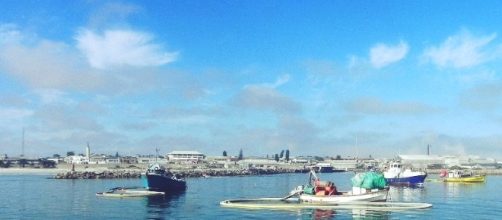West coast diamond divers are a hard breed of men. These commercial diving experts do one of the world's tough jobs to make a living. The marine diamond mining vessels they work from are practical rather than luxurious. They are crammed with dive gear and machinery.
The vessel I am on is no Queen Mary. Cabins are dank and cold, every space is crammed with first aid kits, food, tools, pipes and compressors that boggle the mind and in the little galley what looks like black bean soup perks away on the gas stove. The commercial diving men who live aboard for days on end surround me.
They sport tattoos and muscle bulk, yet they engage me with almost quaint old-fashioned good manners.
Diamond mining opportunities for divers
I am lucky to be here. Sea medicals and pre-sea safety inductions came my way through a work connection. Not every journalist in the world can get onto the marine diamond mining vessels in western South Africa. Most people equate Namibia with diamonds and the sea's connection, but there are about 25 shallow water contractors undertaking diver-based mining in the subtidal concession areas of the South African west coast.
These marine diamond mining operations are breathing life back into decaying towns like Port Nolloth, Lamberts Bay, and Alexander Bay which thrived in the days before the fishing industry took a head-dive through depletion of fish populations and tightened regulations.
They also offer a young, strong man with a commercial diving certification the promise of good money and a bright future -- if they can handle the life.
The legacy of Texas oilman Sammy Collins in the sea diamond industry
Today's divers are indebted to Texas oilman, Sammy Collins, for the opportunity to work in marine diamond mining.
He formed the Marine Diamond Corporation in Namibia in the 1960's and was undoubtedly the leading influence on extracting diamonds from under the sea once the diamonds on land started to run out. In ten years his company mined around one and a half million carats from under 20 meters of water.
Today, that legacy still inspires young commercial divers who see an opportunity to undertake one of the world's tough jobs by getting aboard small coastal vessels to dive for diamonds.
Diving for diamonds - of the world's tough jobs
Marine diamond commercial diving seems to attract a hardcore type of character: an aura of mystery and danger surrounds them. They play hard and they work hard and you will find their soulmates on oil rigs, driving for "Ice Road Truckers," deep drilling at sea or on land, and on high-rise construction projects.
The cold Atlantic Ocean off the west coast of Africa has a nasty history of killing those who sail upon her waters. Romance and mystery aside, these divers face a cold, hard, and potentially dangerous environment every day that they dive down to the seabed for a daily rate of pay equivalent to around $60.
The weather window is tight, so production days are scarce and time is money.
These hard men unquestionably work hard at their tough job, yet as I stand here under a canopy of shrieking gulls in a bitter wind, a paradox becomes apparent. Not all these men are what they appear to be. I find a fine art graduate, a young farmer, a bartender from Cape Town and a dropped out engineering student aboard. Each of them has done some serious commercial diving training.
They are reluctant to talk specifics about ratios of carats to the seabed gravel they suction up and they won't talk about company operations due to client confidentiality -- but they do talk about the common dream they all share.
The lottery of diamond diving - the game and the motivation
"Peet-o" and "Steve-o," Barny and "Sludge(guts) are not their real names.
Everyone seems to respond to a moniker handle. I ask 'Peet-o' why he dives for diamonds and like the others, he tells me that it is not the daily pay or the hard work that inspires him. It is the prize; the prize that comes when the diamonds are sold at auction in Amsterdam and all the divers get their commission cut.
And will he buy a nice house in Cape Town and settle down and open an art gallery if they land the big stones? I ask him. "No," he replies. "I will probably take it easy for a while and try for my own boat and own concession to mine marine diamonds one day."
It seems that the lottery of luck at sea grips them all. The chances of getting enough big diamonds out the water to enrich everyone along the concession chain are slim.
Even today, when there are more geologists involved, a more scientific approach is applied and improved technology, diamond hunting on the bottom of the sea is financially risky.
A day of lost production through breakdown or incident means a day that can never be recovered. They cannot go back and dive harder or faster to make up lost time. A lost production day in marine diamond mining is a day lost forever and just one missed good sized diamond could make the difference between viability and failure.
'Sludge' sums it up in a few words. "It's very hard work diving for diamonds. We get tired and we are always cold but one day the tide will turn and a nice big fat diamond will come up -- or it won't. It's a lottery, life's a game and I want to play it."

